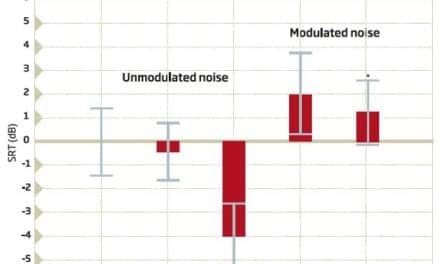Every day, 33 babies are born with hearing loss in the United States. These children and their families face significant barriers to receiving the services and care they need, according to a new survey released by the Alexander Graham Bell Association for the Deaf and Hard of Hearing (AG Bell), Washington, DC, titled Family Needs Assessment: Successes and Challenges, Listening to Their Voices, and a recent press conference.
“The study’s findings underscore our country’s need for affordable, accessible hearing health care, including access to hearing technology and habilitative services for children who are deaf and hard of hearing and their families. This care is critical for these children to be able to develop listening and spoken language right from the start and to reach their full potential,” says AG Bell president Donald M. Goldberg, PhD.
The 1,000 parents responding to the AG Bell survey said that public school options, the cost of listening and spoken language services, and the quality of these services available locally were barriers or significant barriers to obtaining the proper care for their children with hearing loss.
When asked when they experienced the most financially trying times, the survey respondents said all periods of the child’s life included some financial challenges. The most challenging times were between 4 and 6 years old, followed closely by the elementary school years.
With an overwhelming amount of information about diagnosis and treatment, parents raising a child with hearing loss were asked what information sources they trust and turn to most often. Those surveyed said, after medical professionals, Internet sources are becoming the standard for information gathering—particularly those sites with static, informational content. But the parents surveyed said they viewed blogs and personal or community-based online sources more positively than sites with pure facts and static content.
Although social media rated the lowest as a source of information, its use is increasing. Parents with children under 5 rate the use of social media significantly higher than parents of children 6 and older.
When asked who provided the most guidance for parents of children with hearing loss, the respondents indicated speech-language pathologists, followed closely by certified Listening and Spoken Language Specialists (LSLS®) and audiologists.
When it comes to emotional and support services, respondents noted a wide range, including school-based groups, general support groups, connections with local parents, AG Bell and other similar organizations, online groups, therapists, and hearing loss-oriented centers. The biggest benefit from using these resources was meeting other parents and individuals on a similar journey, which was noted by 26% of respondents.
As one survey respondent commented, “Our speech-language pathologist purposefully overlapped her appointments, so when we came in, another family would be leaving, so we would all sit and talk for about 15 minutes before we started our session with her. I cannot thank her enough for how much meeting other parents meant to me.”
The most positive experience on the survey was the Individualized Family Service Plan (IFSP) process. The IFSP includes services that are focused on the entire family while the child is under 3 years old, and is provided under Part C of the Individuals with Disabilities Education Act (IDEA), a major federal education law. Of the families surveyed, 80% said the IFSP was fulfilled. Parents felt included and heard in the process of developing the IFSP.
While many families were satisfied with their IFSP, 53% of survey respondents said they acquired services outside the IFSP, including public services and additional or supplemental services (including audiology services) from private providers.
Parents were less satisfied with their Individualized Education Program (IEP) than their IFSP. The IEP plan serves as the foundation for a child’s access to the general curriculum under special education and is provided under Part B of IDEA. The main challenges identified by survey respondents included a rigid position from the school district; no appropriate support from IEP team experts; and the need to justify an IEP when a child is performing at grade level in mainstream classes.
“The results of this survey provide vital data that can be used by professionals, policymakers, media, and others to transform the lives of people living with hearing loss,” Goldberg says.
The press conference also pointed out that some high-performing children with hearing impairment who achieve above-grade-level scores sometimes encounter trouble having their IEPs continued.
AG Bell is working to increase the availability of culturally relevant and sensitive materials for families and children who are deaf and hard of hearing, as well as access to professionals who have a high level of qualifications to serve children and families.
For more information about the Family Needs Assessment survey or AG Bell, visit ListeningandSpokenLanguage.org/FamilyNeedsAssessment.
Source: Alexander Graham Bell Association for the Deaf and Hard of Hearing




